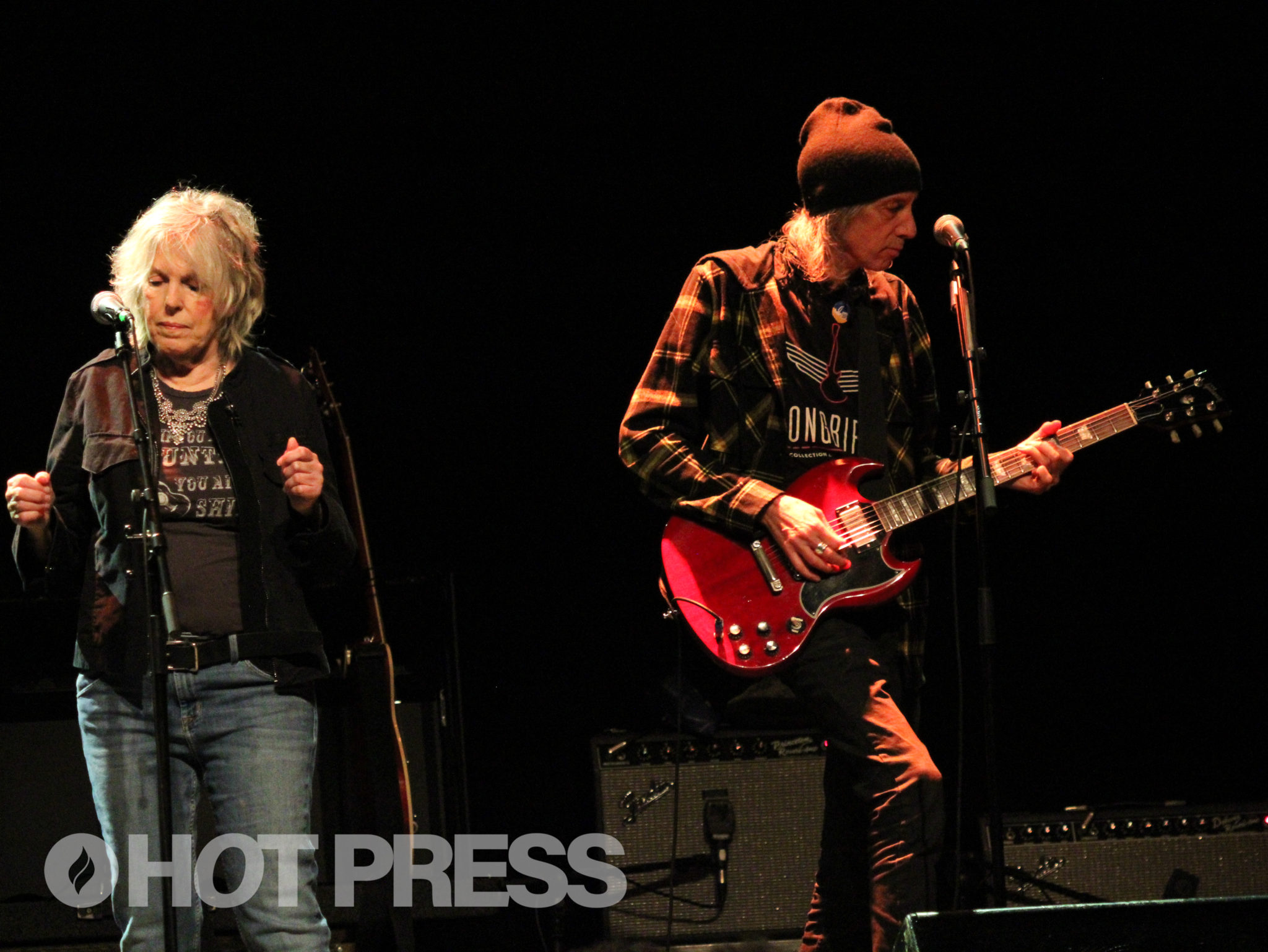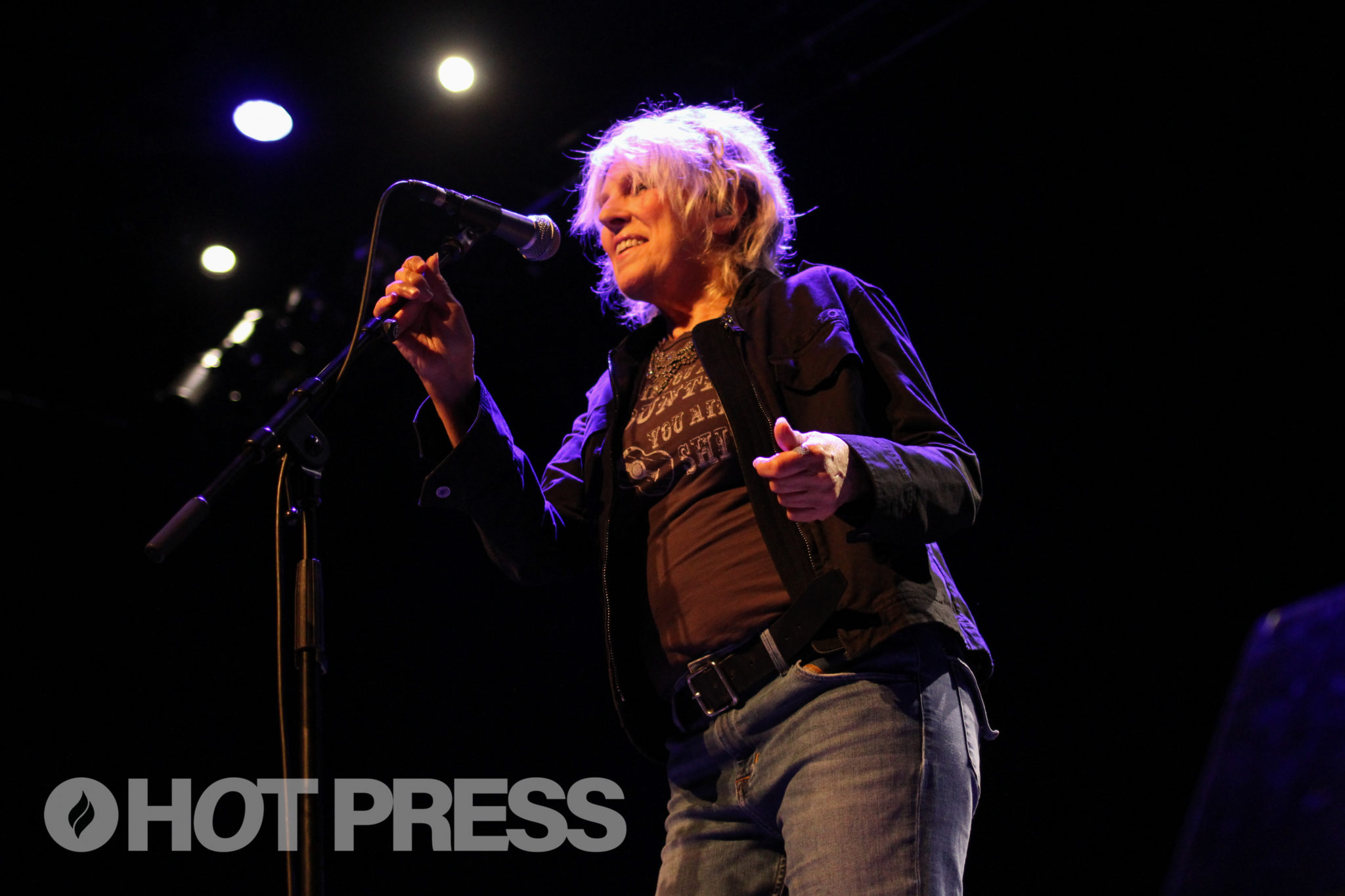- Music
- 30 Jun 23

25 years ago today, Lucinda Williams released her iconic fifth album, Car Wheels on a Gravel Road. Featuring appearances from the legendary likes of Steve Earle and Emmylou Harris, the LP won the Grammy Award for Best Contemporary Folk Album, and has gone to be considered one of the greatest albums of all time. To celebrate, we're revisiting our review of the singer-songwriter's most recent Dublin show – featuring Rowan Stokes' reflections on the influence of Car Wheels On A Gravel Road, and Williams' magnificent powers as a performer...
Lucinda Williams’ last visit to Irish shores came in 2016, when she performed in both Vicar Street in January, and The Iveagh Gardens in July. Seven years have passed and she’s standing on the same stage in The Liberties. The journey there and back can’t have been easy. Not at all.
The uninitiated need to know this: Lucinda Williams is one of the greatest songwriters to have lived. If there’s a dozen songwriters in the top tier of the pantheon, Lucinda is there - no doubt about it. I think if I could stare at the sky for a thousand years, and contemplate how Lucinda is selling out Vicar Street and Garth Brooks sold out five Croke Park dates last summer, I wouldn’t get any closer to understanding it. No hate to Garth - fair play to him and to anyone who bought a ticket. Anyone prepared to spend their hard earned money on music is ok with me – and from Garth’s perspective, the benefits of those gigs for the industry as a whole seem so great that it’s next to impossible to quantify. Nonetheless, the discrepancy seems kinda obscene.
My own journey with Lucinda Williams began as an eight-year old, lying in the backseat of a Ford, late at night, hurtling somewhere across the East Coast of America. Lucinda’s breakthrough record Car Wheels On A Gravel Road had just been released a few months previously, and it was amongst a handful of cassettes we picked up on the road. As I was falling in love with this wild, wonderful and unique country, Car Wheels… became the soundtrack to that trip: the characters, the places, the stories, the language, the emotions: all vivid in the imagination of a child. Late nights, lying in the back seat, drifting in and out of consciousness – it never felt lonely.
So here we all are. Lucinda is backed by her four-man band Buick 6 – the opening notes of ‘Can’t Let Go’ play, and that unmistakable accent rings out. You couldn’t describe the band as tight, or loose for that matter: they’re in a sort zen state beyond that. They’re in the process of finding a groove. There are no mistakes. Stuart Mathis drops his plec, and as he picks it up, Doug Pettibone covers his lead, right on time. Butch Norton and David Sutton beside them, right in synch. Find a groove, ride it. Find another. Surround Lucinda’s straight-talkin’ southern poetry with it. Twin guitars, a mean bass and drums. Lines of beauty breakthrough regularly: "I love you more than this cruel world will ever know."
Advertisement
 Lucinda Williams at Vicar Street. January 25th, 2023. Copyright Abigail Ring/ hotpress.com
Lucinda Williams at Vicar Street. January 25th, 2023. Copyright Abigail Ring/ hotpress.comDeath, depression and darkness is never far from the surface. In America, no one handles death like the southern voices: Townes Van Zandt was the master of it when it came to the human condition, Guy Clark when it came portraying characters and a human connection. Lucinda does both. Before she performs ‘Lake Charles’, she tells us of Clyde Joseph Woodward III, the man she wrote the song for. "We all know a lovable misfit," she mused, "a troublemaker, chaos follows them wherever they go, but you can’t help but love them. Clyde succumbed to his careless wild ways of living and his body gave out on him and he passed away.” The performance is heartbreaking and beautiful.
Other songs are dedicated to her friend Tom Petty (‘Stolen Moments’), who died in 2017, and her ex-manager Frank Callari (‘Copenhagen’), who died in 2007. The quality and depth of the work is wonderfully juxtaposed by a spontaneous audience-led rendition of Happy Birthday, in anticipation of her turning 70 at the stroke of midnight.
‘Fruits of My Labor’ is another highlight. Lucinda’s voice is perfect, Doug Pettibone’s playing is superb and the band find their groove again, this time a relaxed, honey-laced, after midnight sound. An audience collectively transported, again and again, a long way west and a long way south.
Lucinda shows vulnerability throughout the set, touching on depression and melancholia with ‘Big Black Train’ and afterwards discussing the stroke she suffered in 2020, which has prevented her from playing guitar and impacted the movement of her arms and legs, discussed not to gain sympathy, just to explain, to put the audience at ease.
 Lucinda Williams at Vicar Street. January 25th, 2023. Copyright Abigail Ring/ hotpress.com
Lucinda Williams at Vicar Street. January 25th, 2023. Copyright Abigail Ring/ hotpress.comAdvertisement
As the set draws towards its conclusion, anger starts to come to the fore - her performance of Memphis Minnie’s ‘You Can’t Rule Me’ is a giant fuck you to The Supreme Court of The United States of America. It's angry, musically and vocally, with snarling guitars, pounding bass, drums like hammers. From there, ‘Essence’ starts with the same raw venom, but the chorus transcends the anger. Butch Norton strikes the drum like a fucking gunshot, sending sound-waves that vibrate the chest. ‘Out of Touch’ perhaps sums a lot of it up: the passing of time, ageing, lost love, death, the depths of debris left behind.
‘Joy’ isn’t just angry, it’s defiant. As a kid I always assumed it was just about a scorned lover, angry, the refrain “You took my joy, I want it back” repeating over and over – but in the context of the body of Lucinda’s work that has played before it, it seems something more. It’s railing against life, more than just love.
An encore follows with ‘Righteously’ and finally Neil Young’s ‘Keep On Rocking In The Free World’ – a joyous and cathartic rendition to say goodnight, the crowd in full swing, singing ever word, living every word. Time and time again, over the night her strength has come through: life throws uppercut after uppercut and Lucinda is still standing tall. In fact, we all are – or that's the feeling that Lucinda evokes.
Ultimately that’s what it’s really been all about – the triumph of life, of those who survived, of everything that’s passed and brought us here and and all the days that are still to come. And of course, most importantly, the triumph of music, with its power to elevate, to heal and to connect the audience, the artist, the art and the place – all as one, for one brief moment.
Revisit Car Wheels On A Gravel Road below:
Read Pat Carty's review of Stories From A Rock N Roll Heart, the new album from Lucinda Williams, released today, here.








